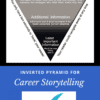
Does this sound familiar?
You’ve never had a résumé (or professionally developed résumé) before. Maybe you’ve never needed one. But now you do. And you don’t know where to start.
The primary purpose of the résumé is to get you the opportunity to interview for the job. Everything you do — and include — should focus on this goal.
Your résumé should be targeted to be effective. If you don’t know what you want, it’s going to be difficult for the reader to know. The first step is to determine what skills, experience, and education are needed for your target job.
The late résumé guru Yana Parker used to say, “A résumé without a job target is like a book without a title.”
Understand that your résumé is not a “career obituary.” It will not — and should not — include everything you’ve ever done in your career.
It still needs to be accurate, but you don’t need to list every job you’ve ever held. Nor do you have to list every aspect of the responsibilities that you held.
Your résumé is not a legal document, unlike a job application that asks you to list all your career experience and that you sign, acknowledging that the information is accurate and complete.
Instead, your résumé is a marketing document.
The most important thing to remember is: The résumé is not about what you want — it’s what you can offer to an employer.
In her book, “Résumé Magic,” author Susan Britton Whitcomb explains there are 10 main reasons that motivate employers to hire. These include your ability to help the company:
- Make money
- Save money
- Save time
- Make work easier
- Solve a specific problem
- Be more competitive
- Build relationships/an image
- Expand business
- Attract new customers
- Retain existing customers
Everything you put in the résumé — or don’t put in the résumé — should relate to the job that you’re seeking, demonstrating to the person with the authority to hire you for that job what you can do for the company in that position. When trying to decide whether or not something is relevant, think about the hiring manager.
Technology has changed the hiring process in some ways, but the essence is still the same: How can you attract the attention of the person who has the power to hire you and get the opportunity to get in front of him or her and demonstrate you’re the right fit for the job?
If you are submitting your résumé online, it’s very likely that your résumé will go into an applicant tracking system, which is software that helps hiring managers track applications and select which candidates to interview.
Applicant tracking systems — and the integration of technology into the application process — underscore the importance of tailoring your résumé and cover letter for the role you’re seeking. If there are specific words and phrases used in the job announcement, make sure those are included in your résumé. You can’t simply create a résumé and use it to apply to 100 different jobs. Not only is that inefficient, but it’s ineffective.
Résumés are not “one size fits all.” You can’t expect a résumé focused on one type of role to open doors for you in another career field. A résumé written for a job as a middle school principal is not likely to generate interviews for a role as a sales professional. Nor is a résumé written for a social media specialist going to work for someone applying as an executive assistant. There may be aspects of the résumé that you can use in both versions of the résumé, but you can’t use the same document.
Nor can you copy someone else’s résumé — even if it’s incredible — and expect it to work for you in landing your dream job. Even if the résumé lands you an interview, you need to be able to speak to the experience and accomplishments described. You not only have to walk the walk, but you also have to talk the talk.
Tell a story with your résumé. How did what you’ve done in the past lead you to the right combination of skills, experience, and education for the job you want? Who are you? What sets you apart? What can you do for the company that no one else does?
If you are a recent graduate with little to no work experience in the field you’ve studied and are targeting, your strongest qualifications are your just-completed education and any internships, projects, or relevant volunteer experience.
8 tips for your first or first professionally developed résumé:
1. Have a clear job target in mind. If you’re applying for similar positions within a career field, the body of your résumé won’t change too much. But you will want to customize it with keywords and specific phrases that tie into the position as well as the culture of the company you want to work for. Don’t have a specific company in mind? Find job postings for 3-5 positions you’d be interested in and use these to inform the content you include.
2. Make sure the résumé is visually appealing. The résumé should be designed to appeal to a human reader, even if it initially will be electronically submitted (and likely will go through applicant tracking system software).
3. Focus on accomplishments. It’s often said that “past performance is the best predictor of future results.” Hiring managers can get a sense of what you can do for them by what you’ve accomplished in your previous jobs. Employers want to hire people who can generate results for them. Outlining the challenges you tackled, the actions you took to solve the problem, and the results you generated can be a powerful way to attract the attention of a hiring manager. Quantify the results in terms of numbers (money and percentages are particularly powerful).
4. Follow conventional style. Résumés use a unique style of writing that emphasizes brevity. Résumés use a version of first-person style, but omit the subject (“I,” “me,” and “my”) and most articles (“a,” “an,” “the,” “my,” etc.), except when doing so would negatively impact the readability of the sentence. Use present tense for activities currently being performed, and past tense for past activities and achievements. Résumés are written in a strong, active style that emphasizes action verbs (“direct,” “manage,” “develop,” etc.”) instead of passive descriptions of activity (“responsible for,” etc.).
5. Remember to emphasize what makes you valuable to your next employer, not what you want. Go back to the employer buying motivators list and look for opportunities to showcase how you can be an asset to your employer in one or more of these areas. The résumé should include everything the hiring manager needs to know about you in order to decide to interview you. It should ignite the interest of the hiring manager, making you appear desirable and potentially valuable to the organization.
6. Experience is experience, even if you didn’t get paid for it. If some of your best accomplishments and most impressive experience comes from volunteer work, include it! Where have you gained experience through projects, internships, leadership roles, and community service?
7. Proofread it, then proofread it again. Print it out, set it aside for at least a day, and then come back and read it with a fresh set of eyes. Look for misspellings, inaccuracies in job titles and dates of employment, and grammatical errors.
8. Don’t go it alone. If you are overwhelmed by the idea of how to put these principles into action, consult with a professional résumé writer. The time and money you invest in having your résumé professionally prepared may not only shorten your job search and help you land the interview, but it can give you confidence by arming you with a powerful job search tool that can help guide the interviewer to discover you’re exactly what the company needs!
Need help? At Total Resumes, we create brand-driven, achievement-focused documents for executives and aspiring leaders worldwide. With a 99% client interview-winning success rate, we are well-placed to help with your career advancement. Check some of our work here: https://www.totalresumes.com.au/samples-of-our-award-winning-work/

